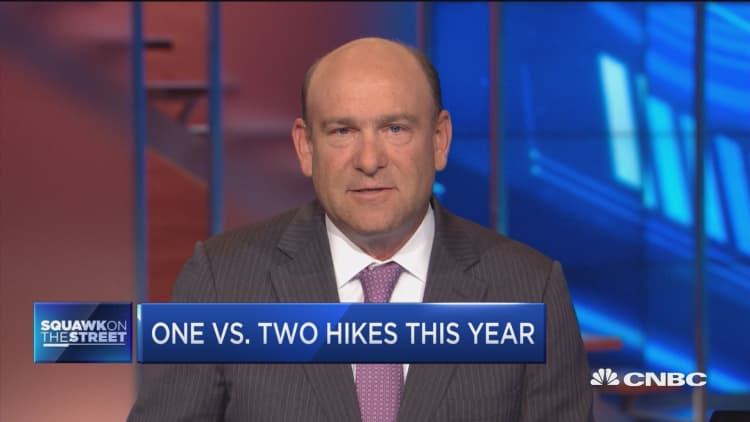
If Fed policy was a fairy tale, the title might be "The Central Bank That Cried Wolf."
Investors have watched in bemusement as Fed officials throughout the past several years have warned that policy would change, only to back down at the slightest sign of turbulence. It now appears the market is no longer taking the Fed's threats seriously.
In a speech Monday, Fed Chair Janet Yellen gave only modest signals that she was reconsidering policy, which just a few months ago was geared for as many as four interest rate increases this year. Nevertheless, a market bracing for a high likelihood of a summer hike now is considering that "we may well not see one," said David Rosenberg, chief economist and strategist at wealth management firm Gluskin Sheff.
"She carries the only vote that really matters," Rosenberg said of Yellen, whose remarks were taken as dovish enough to push along a market rally Monday that carried over to Tuesday.
A June rate hike, thought to be on the table only a few weeks ago, now has just a 2 percent chance, according to the CME's Fed tracker. July has a slightly better chance, with odds increasing through the year.
Looking at the current fed fund futures contracts, a full hike isn't priced in until April 2017, with a second hike not until July 2018.
Of course, the futures market is volatile and subject to the rapid change that a high-ranking, hawkish Fed official or two can drive. But underlying it all is a fading level of credibility in which the market increasingly disbelieves the central bank's professed resolve to normalize policy and start raising rates again.
"The risk the Fed runs in having sounded, and continuing to sound hawkish, is that it drains credibility from their pronouncements when the data weaken and they are forced to go slower than they wish," Aaron Kohli, an interest rate strategist at BMO Capital Markets, said in a note to clients. "This helps to desensitize the markets to their rhetoric, and investors simply react less to hawkish Fedspeak."
The development is especially maddening considering the lengths to which the Fed has gone to try to dispel investor complacency regarding rate hikes. Minutes from the April meeting stated, "Some participants were concerned that market participants may not have properly assessed the likelihood of an increase in the target range at the June meeting, and they emphasized the importance of communicating clearly over the inter-meeting period how the committee intends to respond to economic and financial developments."
Multiple officials have followed up with statements that the market anticipated as leaning toward at least one hike this summer. Then Yellen spoke, and that all changed, regardless of internal worries that the Fed is sending mixed messages.
Yellen listed as a concern the May nonfarm payrolls report, which showed the economy created only 38,000 jobs, the worst month in five years. Yellen stressed that one month does not make a trend, but the larger problem may be that a Fed professing to be data dependent can't decide on which kind of data it depends.
"Though extremely unlikely to happen, it occurs to us that the best way for the Fed to guide the markets in this case might be to simply say less and let the market adjust to incoming data rather than trying to manage hike probabilities higher through jawboning," Kohli said, repeating a growing theme on Wall Street.
The Federal Open Market Committee holds its next two-day meeting in a week, so the language that's released afterward will be critical. Yellen did say her views on the economy had not changed much since March, when the FOMC released projections indicating two hikes were likely this year. The Summary of Economic Projections, which will be released in conjunction with the post-meeting statement, will help give more clues where policy is headed.
In recent days, Fed officials have been talking up growth and the strength of the economy, but the market — at least this week — believes the central bank's actions will speak differently.
"The Fed appears to believe that perception makes reality, so it will never stop trying to create the rosiest perception possible," said Peter Schiff, founder of investment firm Euro Pacific Capital. "It may view its own credibility as expendable."


